
Are you looking to share your love of SCUBA and educate others? There’s no better way to do so than becoming a SCUBA instructor. Our private SCUBA instructor diving courses open the door for serious divers to turn their passion into a way of life. With the determination, practice, and proper certifications, you’ll be able to teach people about the sport you love – and get paid in the process. Join Dreaming Sea Divers for Instructor Development Courses, happening October 16th-24th, 2022!
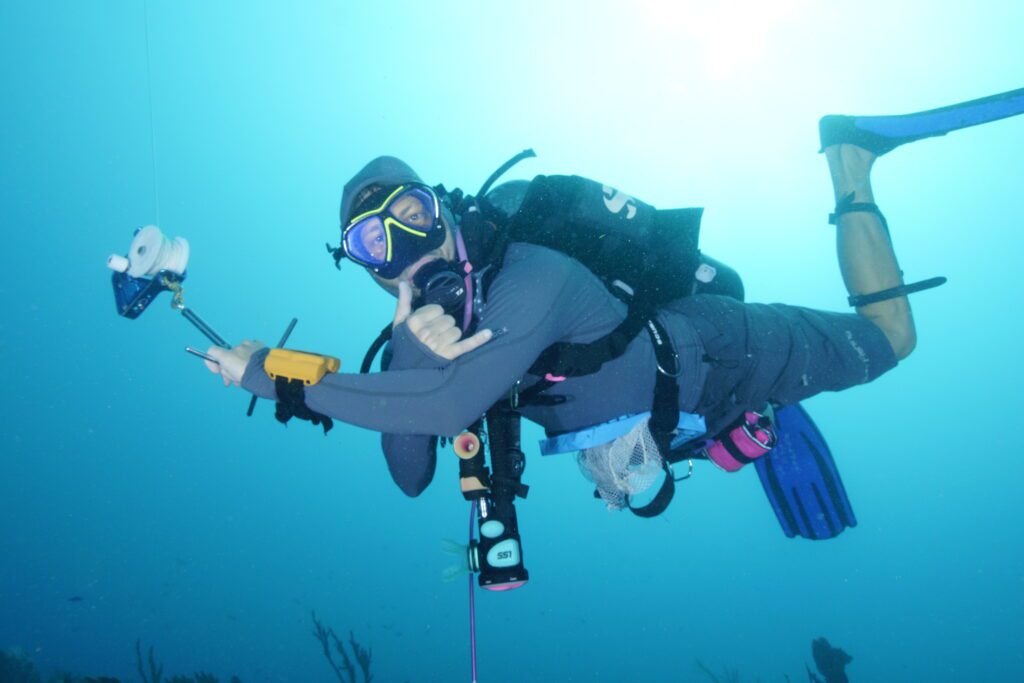
This private SCUBA certificationcourse enables participants to obtain the first level of professional diver in the SCUBA industry: Divemaster. This distinction will allow you to work in the industry to guide certified divers, assist instructors with training, and teach a select number of courses (like refreshers).
Those interested must be 18 years or older, have a minimum of 40 logged dives, and must bring their own basic SCUBA equipment. Additionally, a Rescue Diver and CPR Cert from and recognized agency is a prerequisite. Throughout the course’s instruction, participants will conduct activities like:
Please note that the Divemaster Course does not include rental gear, so come prepared! For more information, visit the course event page. We’re excited for you to partake in our West Palm Beach SCUBA instruction to become a role model and mentor to fellow divers!
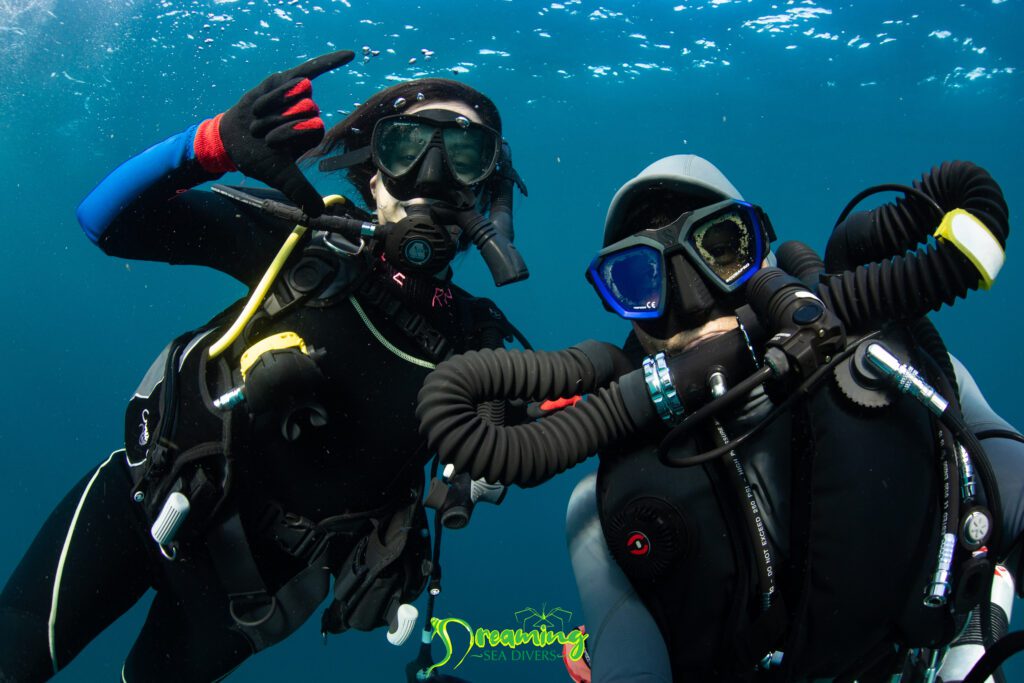
This course grants participants the knowledge to teach and certify students from Open Water up to the Divemaster level. Through the Instructor Development portion of the course, you will learn how to teach to the standards of SCUBA Diving International. Scenarios will be presented to test your aptitude in dealing with potential difficulties students may have along the way. We’ll also go over the business aspects of diving so you can be armed with the know-how to make diving a career. From there, you will be evaluated on your instruction abilities.
Those interested must be 18 years or older, have a minimum of 100 logged dives, and must bring their own SCUBA equipment. A Divemaster or Assistant Instructor and CPR Certification from a recognized agency is a prerequisite. Throughout the course’s instructional workshops, participants will learn about:
Please note that the Instructor Development Course does not include rental gear, so come prepared! It does, however, come with the Pro OWSI Kit. For more information, visit the course event page. Come learn from a renowned South Florida SCUBA diving certification instructor, and leave with the experience to start your own operation!
As an avid diver, you know that your skills and equipment can take you to places otherwise unimaginable. The best way to show the world below the surface to others is educate and get them physched about diving.
When taking one of Dreaming Sea Divers’ Instructor Development Courses, you’ll go home with the necessary skills to begin your journey as a professional dive instructor. Reach out to John and the crew to reserve a spot on our SCUBA West Palm Beach diving course roster. We’ll see you with fins on and an appetite for learning!
Dreaming Sea Divers is located in West Palm Beach, Florida; one of the best diving locations in the world. Renowned for its diverse marine life, variety of reef depths, and close proximity to the Gulf Stream, West Palm Beach has a little bit of everything. Our Florida SCUBA diving lessons are your ticket to beautiful scenery, remarkable aquatic life, and an unmatched location. See why you should book an experience with Dreaming Sea Divers!
SCUBA diving FL has a bounty of wrecks and reefs! There’s Breakers Reef, a two-mile long stretch of coral reef that's home to Caribbean tropical marine life, green morays, spiny lobster and fish from the Pelagic zone. Next is The Corridor, known as a collection of “shipreefs” for hosting many wrecks that you can dive to on a single tank. Mere minutes from the Palm Beach Inlet, you can find the 185-foot Greek luxury liner Mizpah in 90 feet of water, the retired PC1170, a 165-foot patrol boat sitting off of its bow and a path of rubble leading to the Amaryllis: a massive 441-foot freighter that slammed into Singer Island in ‘65.
When you come our way for West Palm Beach SCUBA diving lessons, you'll be amazed at the scenery in our clear blue waters. The shallowest depths we dive to in the reefs are 40 feet on top and 60 feet in the sand. Our deeper reefs start at 65 feet and drop to 90 feet in the sand. Many of our reefs have a double ledge system advantage where we can weave back and forth to save us bottom time and explore the view. This includes several wrecks starting at 65 feet down that have been intentionally sunk to attract marine life and promote coral growth. Some of these wrecks are even accessible to enter and look around inside!
May through August are the best months to observe leatherback, green, and loggerhead turtles nesting on the beaches and swimming back to the reefs. We see plenty of hawksbill turtles as well, though they don’t mate and nest here in Palm Beach. On our “Wreck Treks,” we are often joined by schools of Goliath grouper fish, and sometimes we see several species of sharks which can be photographed safely from a distance. Between August and September, it's possible to see over 30 giant groupers that congregate here to mate.
The dive sites we visit are populated with many species of moray eels, angelfish, butterfly fish, grunts, and snappers. Occupying our reefs are loggerhead, Kemp’s Ridley, hawksbill, and green turtles, octopus and squid, and anemones that house tiny shrimp. If we’re lucky, the manta rays, whale sharks and great white sharks may make a special appearance!
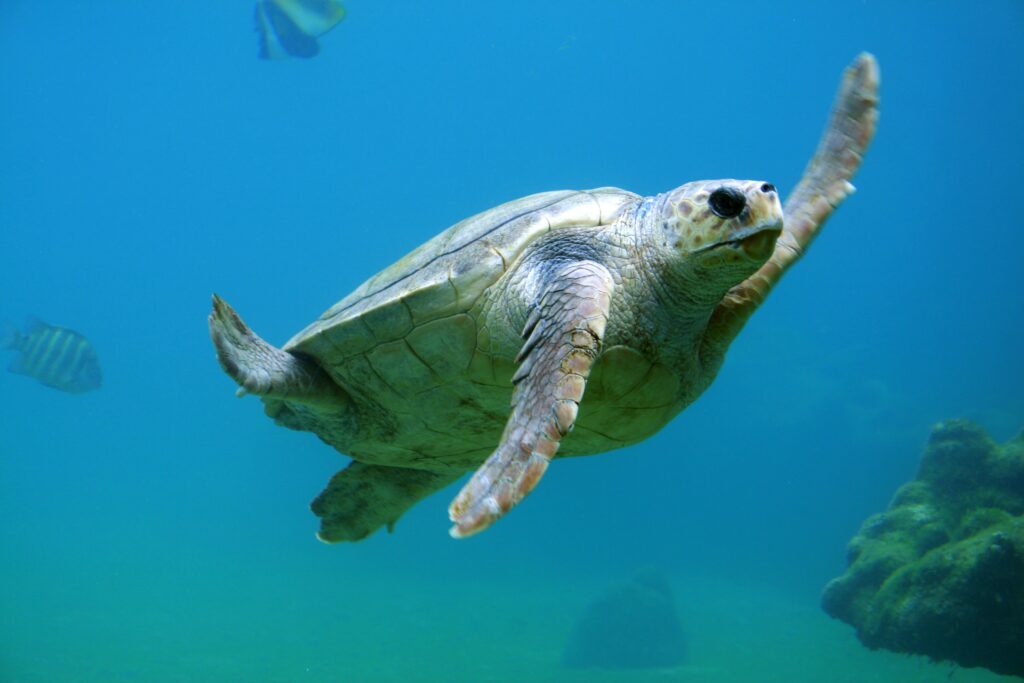
Our reefs are full of game fish and crustaceans, if you want to dine after your dive! Palm Beach hosts crabs, lobsters, clams, scallops, hogfish, snapper, grouper and cobia. Lobster hunting season is early August through the end of March, if you want to catch dinner eight months out of the year! Spotting the spikey lionfish is probably the coolest, though not so much for our reefs. This species is invasive and harms the reefs - but you could help by catching them to eat, if they suit your palette.
Blue Heron Bridge at Phil Foster Park is a world famous dive site, right here in Palm Beach. Divers have come here for decades to observe and photograph rare marine life that are hard to find elsewhere. These include batfish, frogfish, seahorses, manatees, sea robins and flying gurnards, bumblebee shrimp, spotted eagle rays, yellow spotted stingrays and pipefish. In addition, you can enjoy many types of blennies, tropical fish, and eels. What more could you ask for? Something else great: the deepest spot here is 23 feet, which means we do not have to be concerned about decompression limits. Keep in mind though, we are limited here by a daily two-hour window based around Slack High Tide (the weakest currents) and air consumption. We'll go over all of that during your South Florida SCUBA diving certification.
Jupiter
Jupiter is referred to as a small drinking town with a fishing problem. There is a famous lighthouse that’s worth climbing and plenty of fun shops and wonderful restaurants, some right on the water. The Square Grouper restaurant is the site where Jimmy Buffet recorded the music video for “It’s Five O’Clock Somewhere” with Alan Jackson. The diving is slight deeper and the currents are normally a little stronger than Palm Beach, but the reefs are filled with tons of life. There are also some exciting wrecks and good hunting spots in Jupiter as well.
Fort Lauderdale
Known as the “Venice of America,” Fort Lauderdale residents are passionate about the water and watersports. There is an artificial reef program that has sent dozens of wrecks to the seafloor, along with three retired oil platforms known as the Tenneco Towers. While these are cool to explore, you may find that several grunts, snappers, sponges and sometimes bull sharks are attracted to these as well!
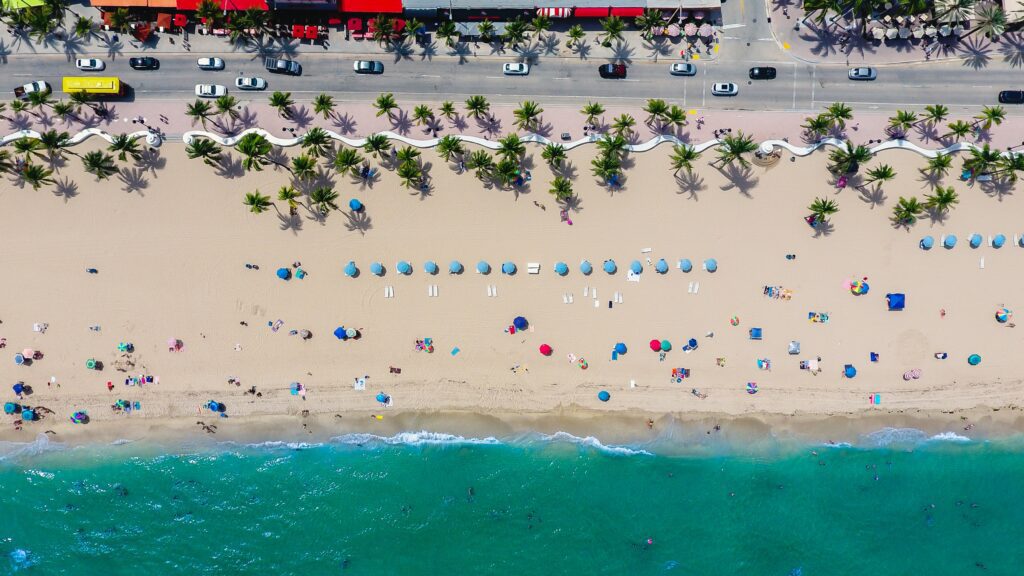
Miami
While best known for its pop culture and beach life, Miami is also a secret diving hub with wrecks that can be visited on a single tank. Go-to sites include the Miss Patricia (a 65-foot steel tug), two M60 tanks, the 110-foot Billy’s Barge, Ben’s Antennae Reef and the Miss Karline, a 100-foot ship lodged in the sand near the Patricia. But, the best is for last: The Spirit Of Miami, a retired Boeing 727 that made its final landing off Key Biscayne!
To prepare you for all dive sites in South Florida we may visit, you should know that water temperatures range from the mid 70s in winter to the mid 80s in summer and visibility is generally in the sub-100-foot range.
Dreaming Sea Divers will ensure that your dive trip in South Florida is easy, comfortable, and the experience of a lifetime! Become a certified diver through our private SCUBA courses and then embark on a private guided underwater tour with instructor John starting at the Blue Heron Bridge, or on one of the many comfortable dive boats! Get in touch with Dreaming Sea Divers today to plan and embark on your unique South Florida diving adventure!
Special note: Interested in becoming a Dive Professional? Check out John's upcoming Instructor Development Courses going on from October 16th - 24th 2022. SPACE IS LIMITED, SIGN UP TODAY!
If you’ve ever wanted to go SCUBA diving to explore the enchanting world under the sea but weren’t sure how to go about it, then Dreaming Sea Divers is for you. Located in West Palm Beach, Florida, Dreaming Sea Divers was formed by lead instructor John Phillips in April 2019 to turn his passion for diving into a career to teach his students how to become confident divers, so they have a fun and safe dive every time.
As a certified SCUBA and Freediving Instructor, John trains his students so they become certified, self-sufficient divers, and can further their training to even higher levels. Having a private SCUBA dive guide like John provides certified divers the opportunity to take a guided underwater tour where their risks are reduced and enjoyment is enhanced as John helps them explore the waters.
Dreaming Sea Divers offers various types of guides for your unique underwater adventure. Keep in mind these services are only available for certified SCUBA and free divers:

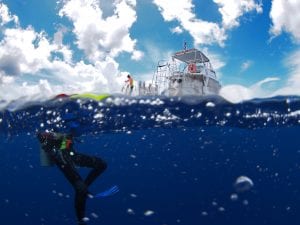 Keep Swimming With a Private SCUBA Guide…
Keep Swimming With a Private SCUBA Guide…Choosing the Dreaming Sea Divers team as your private diving tour guides will not lead to your disappointment. Need even more reasons to go with Dreaming Sea Divers?
The supportive and knowledgeable diving instructors and the manner in which they have designed their private guided tours make all the difference. Has it been a while since you went diving? What about if you have some physical challenges that make it difficult to dive on your own or without someone who is trained? Not a problem - John and the Dream Team are there for you. Going diving with your group for a special occasion? Just want to practice your technique to get better? Right on! Dreaming Sea Divers designed their services for these types of needs. The team even offers private shopping guide services for their clients to help them select and learn about the perfect type of diving gear they want or are looking for!
You’ve Reached The Bottom! Time To Get Neutral.
At the end of the day, the best advantage of hiring a West Palm Beach private dive guide through Dreaming Sea Divers is because it is fun and they can help you with your diving technique! With services personalized to you, no matter your experience or confidence level, John’s team at Dreaming Sea Divers is here for you.
Ready to book your private guide tour and dive under the sea? Contact John Phillips at Dreaming Sea Divers to learn more about the private dive guide experience.
You’ve probably heard that 71 percent of the earth is covered in water. Did you know that the ocean holds about 96 percent of it? SCUBA diving has grown in popularity and accessibility since many people can readily explore the ocean all around the world. Whether you are on vacation or live near the sea, this fun, non-competitive underwater sport is ready to take you on an adventure.
Some people may not know there are a variety of SCUBA diving courses available to them. You can either learn to dive from or maximize the day by diving from a boat, sometimes reaching harder to get to spots.
Here we go over the pros and cons of both SCUBA diving types so that you can choose the right venture for your first time:
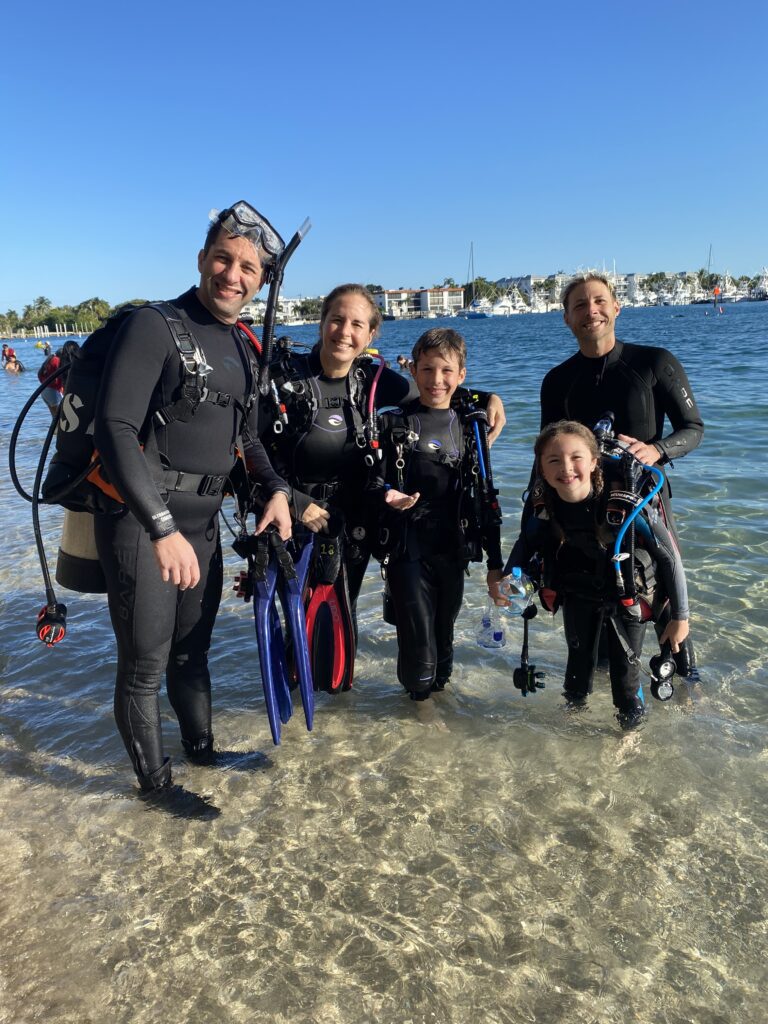
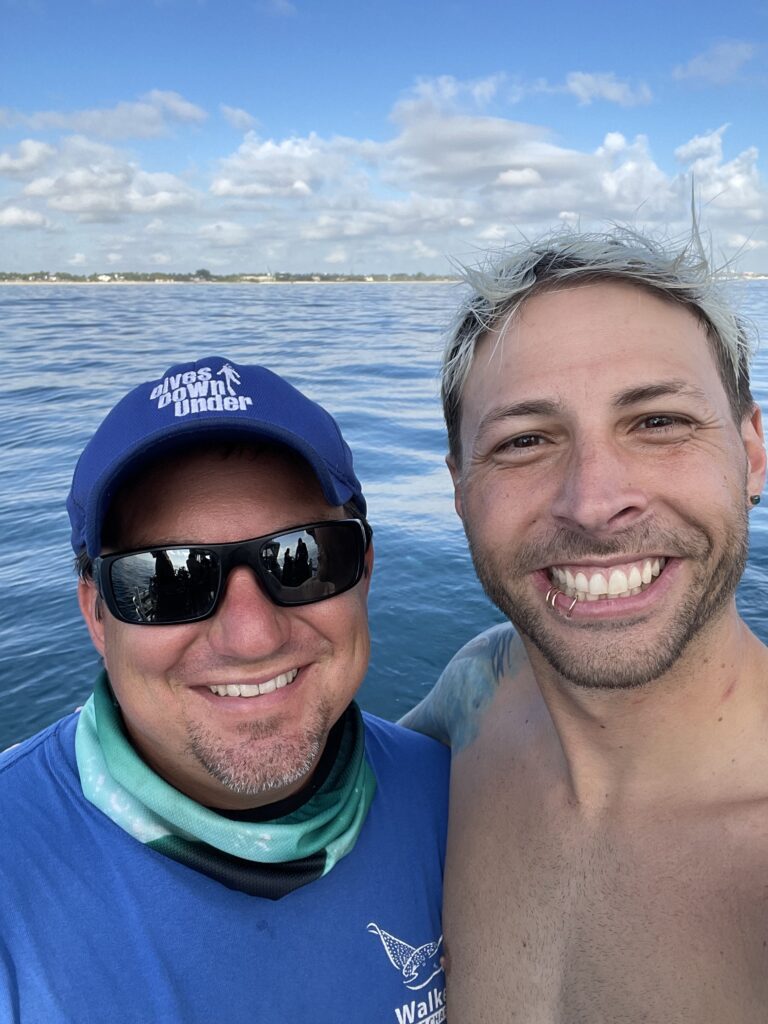
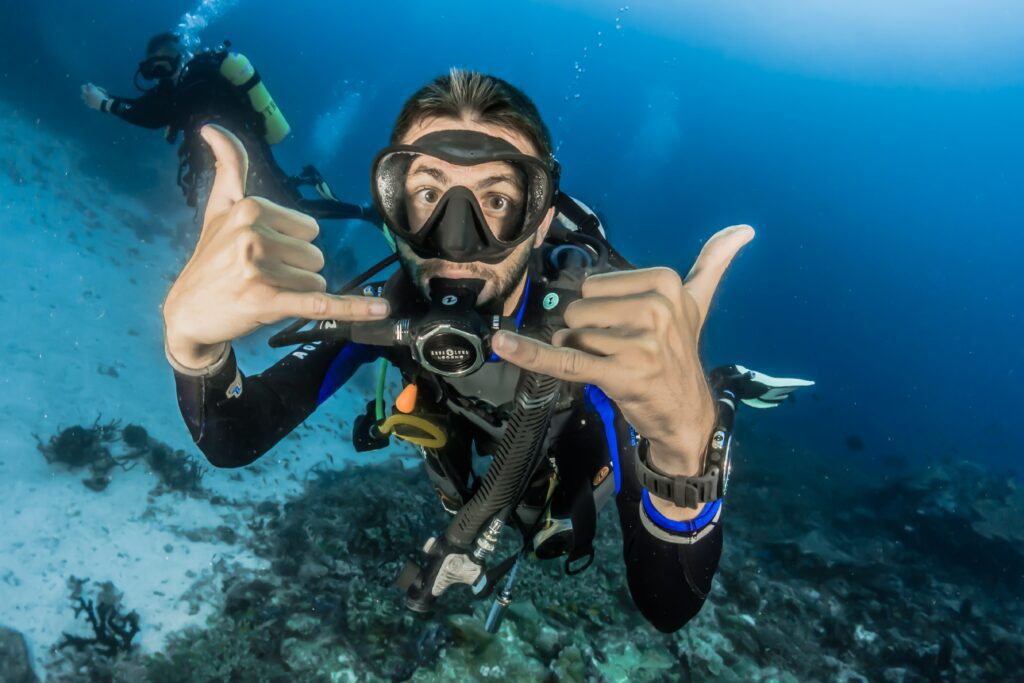
This list is a great way for you to decide what kind of diving is best for you after certification or perhaps during your courses. The pros and cons of shore diving in comparison to boat diving are ultimately relative to the individual experiencing the adventure. No matter what you’re looking for, Dreaming Sea Divers makes sure you have fun learning the fundamentals while exploring safely.
With most classes that we offer, Dreaming Sea Divers includes some shore diving and some boat diving so you get to learn for yourself which you like better and you can see first hand the pros and cons.
We created Dreaming Sea Drivers to make sure you become a confident SCUBA diver. We offer a series of courses tailored to supplement your diving knowledge. Whether you are visiting West Palm Beach or a local to Florida, allow us to give you private SCUBA diving lessons or a private guide from shore or boat. Our goal is to give you an exciting and relaxing experience you'll never forget.
Contact us today to book your next SCUBA diving classes!
If you’re an advanced scuba diver and have yet to take your rescue diver course, now’s the perfect time to change that. After reaching the level of Advanced Open Water diver, you may be wondering what your next big challenge could be, and this is it. The Rescue Diver Course isn’t just challenging though. It’s also a rewarding and fun experience that many advanced divers consider to be their absolute favorite course.
So, if you’re looking to continue your diving education, grow your confidence as a diver, and want to help others in the process, then consider getting your Rescue Diver Certification with a certified SCUBA instructor.
The rescue diver certification is part of the advanced scuba diver courses and is obtained by divers who have proven their diving skills are developed enough to help others in need of assistance. The rescue scuba diver course teaches divers different techniques to avoid and manage problems in the water with confidence. Once you’ve completed the course, you’ll be able to identify potential hurdles, perform dive emergency protocols, and provide first aid and rescue methods to those in need.
Some of the topics included in the rescue diver course include:
This class focuses on preparing you to be able to help yourself in the water, your buddy and fellow divers under and above the water if troubles arise. Eventually, in your diving career, you will need to perform a rescue. It could be as simple as a tired diver tow or reminding someone to inflate their BCD on the surface. This course will build habits so that when the time arises, you know what to do and how to do it to help the other diver and protect yourself in the process. You will also learn some invaluable self-rescue techniques and refresh your basic dive skills.
The key to a successful rescue course is developing your confidence as a diver. It will significantly help you in a difficult or stressful situation.
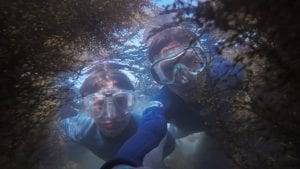
Rescues, as previously mentioned, sometimes involve giving a small amount of help to a diver that provides a big impact to their safety and comfort. Sometimes, however, divers will panic and not respond to instructions. It is our instinct to try to help someone in need but without proper training, it is possible to put yourself in harm's way and get yourself hurt while you are trying to provide aid to another diver. The Rescue Course will cover basically every scenario you may come across and teach you different ways to defensively help the other diver and get you both to safety.
The course starts with self-rescue techniques, reminding you how to remove cramps on yourself and the importance of becoming positively buoyant on the surface, for instance. We then focus on rescues from shore or the boat when it is not necessary to enter the water to help. We will then go on a dive and show you ways to deal with distress and panic underwater. Lastly, we deal with the worst-case scenario, finding a diver unconscious and not breathing underwater. It is a rigorous, exciting, and truly rewarding course. Parts of it will challenge you. Parts of it will remind you of things you've forgotten from previous courses.
Once everything in diving has become a habit to you, you’re ready to start your rescue diver certification. These habits include regularly checking your air and no decompression time without being reminded, and effortless buoyancy that you don’t have to give much thought to. Your pre-dive checks also need to be all habit and thoughtful.
Once you’ve developed confidence as a diver and have solid experience under your belt, you can enroll in the rescue diver course, I promise you won’t regret it!
Everyone should take the Open Water, Advanced Open Water, and Rescue Course. We go over some rescue techniques in the Open Water class but all of the skills covered in the Rescue Diver course cannot be covered in the OW and AOW courses. Kids, adults, men, women, people who dive once a year, and people who dive every week should all be trained in rescue not just for safety purposes, but for peace of mind as well.
Eventually, you will use your rescue skills, even if it isn’t in a dive setting. But, the more often you dive, the more often you will use the skills. It is imperative that you're trained to do them properly so as not to hurt yourself or do further harm to the other diver.
You may start the Rescue Diver Course immediately after completing an Advanced Open Water certification or as an Open Water certified diver with 40 logged dives.
Interested in expanding your dive abilities? Then connect with John at Dreaming Sea Divers today to get your rescue scuba diver certification! As a certified SDI and PADI Instructor with thousands of recorded dives on his record, John is beyond passionate about helping others develop and embrace their love for diving. He emphasizes the importance of safety and fun in his courses and is always willing to help a diver improve their skills.
See how John can help you become a better diver today!
When it comes to SCUBA gear, you can either rent or purchase your own equipment. Each option has its pros and cons, but owning your own SCUBA gear is typically more practical for avid or regular SCUBA divers. Not only is cleanliness a non-issue when you purchase your own gear, but it could also save you money and give you more time under the water. Many SCUBA divers prefer to have their own equipment, and it’s easy to see why. To learn about all of the benefits of owning your own SCUBA gear, take a look below.
One of the first things you should consider when deciding if you want to purchase your own gear or continue renting it is how often you plan on going SCUBA diving. Avid divers who plan on taking several SCUBA trips a year are going to significantly benefit from having their own gear. Though the initial costs of SCUBA diving are steep, you won’t be paying for these things every time you dive. Most dive equipment lasts for decades and can be purchased second-hand from dive shops or other dive enthusiasts for a lesser cost.
If you plan on diving more than once or twice a year (and you should!), then purchasing your own SCUBA gear is going to allow you to have the best experience and will save you money in the long run. The cost of renting all the SCUBA equipment you need for a day trip can range between $50-$100. This amount quickly adds up and the constant re-renting means you won’t have any gear of your own to bring home, personalize (put everything right where you want it, download your dive log), and take care of.
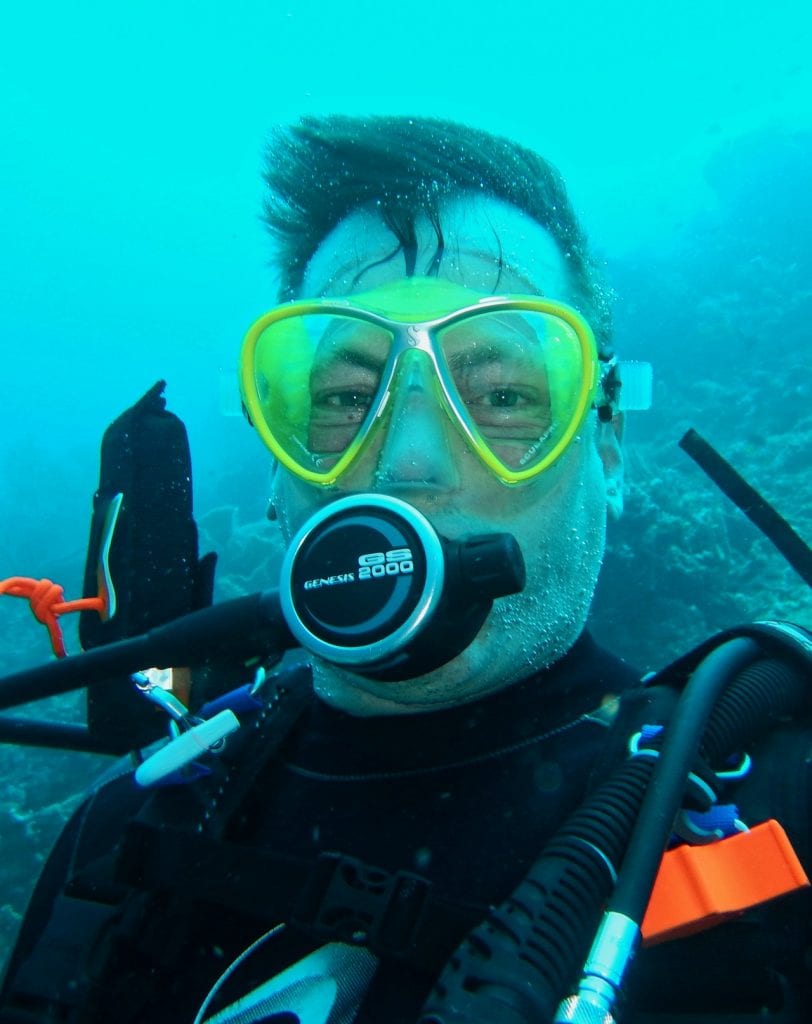 Equipment That Fits Your Needs
Equipment That Fits Your NeedsThe two most basic pieces of SCUBA gear you’ll be required to use with each dive are masks and fins. Both of these pieces are essential to your dive and having ill-fitting masks or fins often results in leaking and can be a huge distraction. Your mask should fit snug against your face so that the suction locks in the air and keeps out water. It should not be the case that you have to tighten it as tight as it goes to keep water out of it. And fins should be all about fit and comfort. This will help prevent unwanted distractions and overworking your muscles.
Another piece of SCUBA gear that is extremely beneficial to own is a wet suit. Wetsuits are intended to keep you warm under the water, but this only works if the suit fits properly. If the fit isn’t just right then you will have water leaking in, making you cold and stopping the dive early. Because of this, it’s crucial that your wetsuit fits you snuggly and doesn’t let in any water. Also, most dive shops don’t offer different thicknesses of wetsuits, only thinner suits that can be very limiting and unusable in cold water conditions.
One of the biggest benefits of purchasing your own SCUBA gear is getting to familiarize yourself with how the equipment works. It’s so important to understand exactly how your gear functions and renting can lead to confusion that may be potentially dangerous in certain situations.
Take, for instance, a dive computer. A Dive Computer’s job is to get you safely back to the surface. If you do not understand where all of the information is or why it is alarming you of something, then it is not helping you. Having one of your own means that there will be no questions about how the device works and you will be able to log every dive you go on. You can set the specific alarms that you want and turn off those that you do not. You can easily set it for the appropriate Enriched Air Nitrox mix because you’ll learn how to do so the same way every time. And, as mentioned before, you can download your dive profiles and log your dives digitally. There are many different makes and models of dive computers and they can take a while to get familiar with. Not only does owning your own allow you to keep track of your dives, but it also saves you time when it comes to getting set up for diving.
Other SCUBA devices that are commonly used and worth purchasing for yourself are regulators and buoyancy control devices (BCD). A middle-of-the-road or higher-end regulator will breathe better than a lower-end one, no matter how deep you go within the recreational limits. BCD’s are not all made the same and do not all offer the same features. Some regulators offer better corrosion resistance than others and some are heavier which makes traveling with them less convenient. The same goes for BCD’s and some are more comfortable than others. These two devices can significantly improve your diving experience and are typically better maintained in your own home with normal use as opposed to heavy use as in being rented every day and dived much more than 100 times a year! BCDs are also customizable and being able to regulate the settings for you and keeping them there can save a great deal of time and hassle. You will put everything where you want every time and you will access it easier. Everything in its place and a place for everything.
One of the main reasons divers purchase their own gear is for maintaining the cleanliness and functionality of the equipment. Owning your own SCUBA gear means that no one besides you is using the equipment. You won’t have to worry about germs from other divers being on your equipment and you know exactly where it’s all been.
You can also rest assured with your own gear that it’s been maintained to your standards. If a regulator is not maintained properly, it can pose a serious threat to the diver. When you purchase and maintain your own gear, you’re able to monitor the functionality of the device better and keep it in fully working condition.
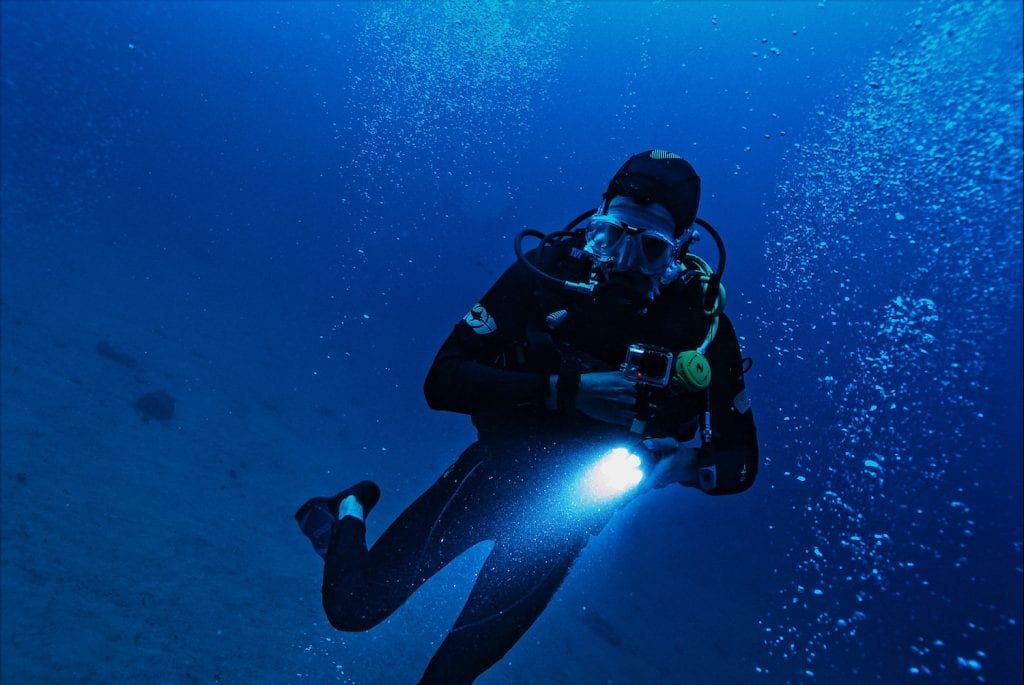
There are several dive accessories that are available for purchase, but not all of them are available to rent. Some of the most popular items are cameras, flashlights, signaling devices, and hunting gear. These items can be purchased and used in several dive trips which makes them worth spending the money on.
There are quite a few pieces of equipment you’ll need for SCUBA diving and if you plan on continuing this hobby or pursuing it as a professional, then it’s definitely in your best interest to purchase your own equipment. There are several benefits to owning your own SCUBA gear and we hope you’ll consider taking the plunge and getting your own equipment.
Connect with John at Dreaming Sea Divers today to get your SCUBA diver certification or if you have any questions about gear! He emphasizes the importance of safety in his courses and is always willing to help new divers improve their skills. See how John can help you become a certified diver today! He is also a huge gear head and has tried many different makes, models, and styles of equipment and loves talking about equipment and helping divers find the perfect kit for them!
Every day, thousands of people make the decision to take up scuba diving. If you are one of them, congratulations! Diving opens a lifestyle of adventure and new experiences unlike anything in our terrestrial world. You’ll feel weightlessness and interact with marine life of all shapes and sizes. Diving is exciting to be sure, but if you haven’t yet taken the plunge, you probably have questions and might even be a little apprehensive. To help make your transition from land to sea a little more comfortable, let’s explore what it’s like to “get certified.”
Open Water Diver is the introduction certification level that allows divers to dive independently—meaning not under the direct supervision of a qualified, active status diving instructor. Generally speaking, being “certified” means having successfully completed this level of diver training.
Open Water divers are certified to a depth of 60’ in saltwater and in conditions similar to those you were trained in.
You might be surprised to learn there are dozens—maybe hundreds—of certification levels including advanced diving options and countless specialty certifications like wreck diving and underwater photography.
After Open Water, Advanced Diver training is the typical next step. As an Advanced Open Water Diver, you’ll be introduced to more diving experiences including underwater navigation and the opportunity to explore depths to 100 feet.

While it is great to learn about future training options, you probably have questions about what your Open Water Diver Course will be like. Common questions among future Open Water Diver students are: Do I have to take my mask off? Do you need to be able to swim to scuba dive? Is it expensive?
Of course, there are countless questions would-be divers ask, but let’s examine these a bit. To begin, mask skills, i.e. removing and replacing your mask are important to scuba diving. A lot of divers fear removing their masks but are surprised to learn it is an easy skill to master.
First off, removing your mask underwater is the same sensation as ordinary swimming without a mask. It’s just water on your face. Something about breathing from a scuba regulator makes it seem more serious, but it really isn’t.
Even the slightest amount of exhalation pressure through your nose will keep you from sucking in water, so water up your nose isn’t a problem after minimal practice. For most divers, it’s never a problem. You can breathe normally without your mask. The weirdest part is that, while SCUBA diving, we only breathe in through our mouth which takes a minute or two to get used to. Once you have that down, clearing and even removing and then swimming without a mask on with the gear is simple.
Clearing your mask simply requires exhaling through your nose while you gradually tilt your head upward. Some masks hold so little water that even the head tilt isn’t necessary. Like most diving skills, you’ll quickly find just the right combination tilt and exhalation volume to clear your mask nearly instantly. Some students don’t believe that adding air to a mask will replace the water inside but it works!
The important message here is, don’t freak out about taking your mask off! It’s no big deal. Promise!
You will need to pass a simple proficiency test, which includes swimming 200 yards freestyle OR 300 yards with your mask, snorkel, and fins. To clarify, “freestyle” in this case means swim that distance pretty much any way you can without the aid of supplemental floatation. In other words, no blow-up ducky or water wings will be allowed.
Some divers choose the mask, snorkel & fins option and just do laps at a manageable pace. The exact number of laps depends on the pool you train in. In any case, it isn’t too much of a challenge for most people. If you set a world record lap time, your instructor won’t be able to verify it to the powers that be, so just go slow!
In addition to the swim, you’ll also be asked to tread water for 10 minutes. The “tread” is another frequent panic point, but seriously, you’ll only be treading water for ten minutes. You’d do it without a second thought if it weren’t a class.
In any case, that’s it for the swimming assessments. Not so hard, right? You don’t need to be able to swim, just snorkel and tread water.
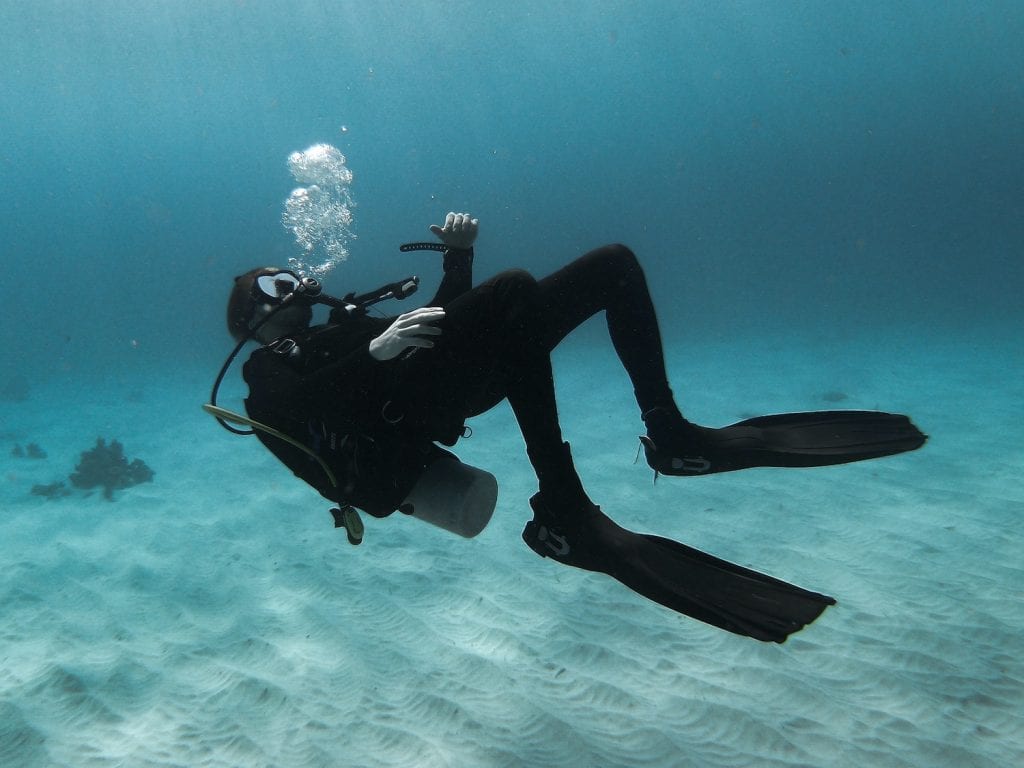
Learning to scuba dive requires access to gear and a minimum level of training (Open Water Scuba Certification). Expensive is a subjective term, but for most who wish to learn to dive, the cost isn’t difficult to manage. Diving equipment can be rented and budget-minded divers often purchase one piece of gear at a time.
In most locations, diving instruction isn’t overly costly. Open Water Scuba Diver is a thorough course that you’ll only take once, so make sure you are comfortable with your instructor. Saving a few pennies in exchange for a miserable experience isn’t worth it.
In most cases, the “resort courses” you find in popular tourist locales are rushed and taught to the maximum ratios of student to instructor. These are typically more expensive than you’ll find where you live as well. If you are planning your first diving vacation, we recommend you learn to dive locally even if you’ll be renting gear onsite. You’ll enjoy better training and spend your days diving rather than in a class.
People new to diving often worry about mask and regulator skills, fixating on the things they fear. Don’t. You’ll find that it just takes a little practice to easily master them.
Diving is a community. You’ll be welcomed into our diving lifestyle with open arms. During your open water course, you’ll likely make lifelong friends and change your own view of the world around you. And you’ll probably never plan a vacation quite the same way.
If you’re still not sure, call us to schedule what some call a “try dive.” Try dive isn’t the best term, however, since you’ll have an opportunity to learn some of the skills you’ll master during your Open Water Diver course.
Whether you are ready to fearlessly charge into your certification course or are apprehensive about the unknown, diving offers a lifetime of real adventures. Ask us anything and we’ll be open and honest with you about what you should expect!
SCUBA diving can be intimidating to beginners but it’s quickly become one of the most popular recreational outdoor activities across the world. Getting started is much easier than you may think, and working with an experienced dive instructor will help you feel more confident and comfortable during your first few dives. There are some vital things to know about SCUBA diving and it’s important to have some idea of what you’re signing yourself up for. Take a look at our beginner’s guide to SCUBA diving and see for yourself why so many have taken up this popular outdoor hobby.
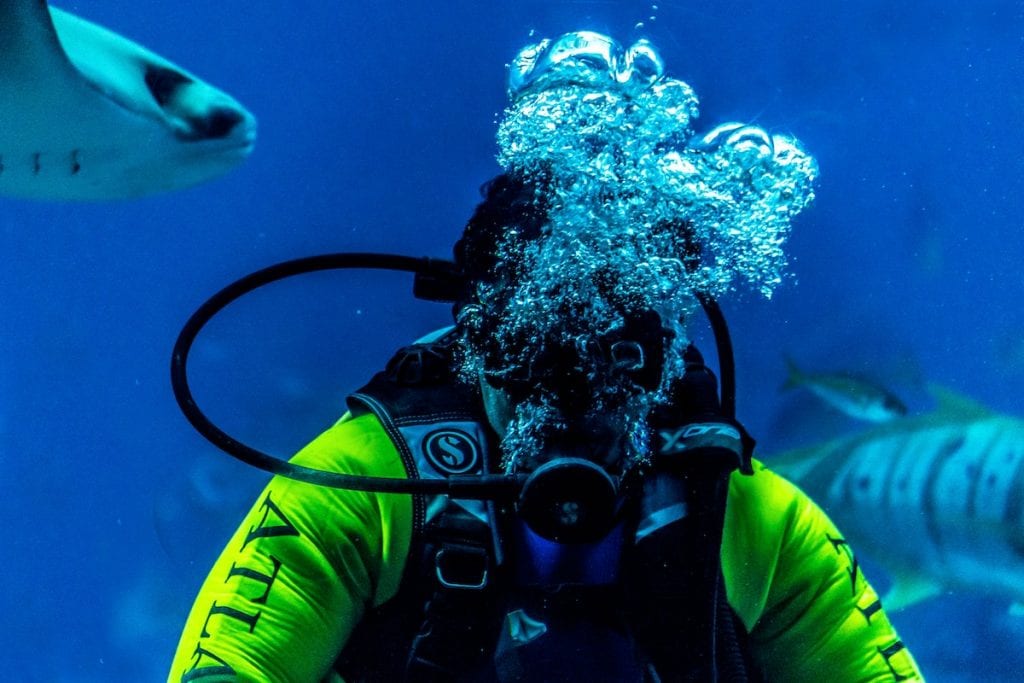 What is SCUBA diving?
What is SCUBA diving?SCUBA stands for self-contained underwater breathing apparatus which is a mechanism used in diving to allow us to breathe underwater and maneuver. SCUBA gear allows you to dive and breathe completely independently of surface air, meaning there’s no need to come to the surface to catch your breath. This gives you greater independence and more freedom of movement while also permitting you to stay underwater for longer periods of time compared to Freediving. (Refer to the blog about the differences between Freediving and SCUBA Diving for more info!)
SCUBA diving can be done recreationally and professionally. About 1 million people across the world are recorded getting their SCUBA certification each year. And there are hundreds of diving careers to choose from including becoming a dive instructor, dive travel leader, naval diver, or hazmat cleanup diver to name a few.
Though there are risks to just about any outdoor activity, SCUBA diving is considered to be a low-risk activity. In comparison, snowboarding, bowling, fishing, and volleyball lead to more Emergency Room admissions than SCUBA diving each year. As long as you utilize safe diving practices and remember the tips and tricks you learn in your Open Water SCUBA Diver Course and subsequent courses depending on your environment, you should have nothing to worry about. The most common medical concerns associated with diving are sunburns, seasickness, and dehydration - which are all easily preventable.
The minimum age requirement for the Junior Open Water SCUBA diving certification in most of the U.S. is 10 years old. Furthermore, anyone under the age of 12 will need to be accompanied by a guardian or guide at all times. This is to ensure the safety and comfort of children as well as their families. Children as young as 8 years old can try it in a pool with a professional!
The bends, which is also known as decompression sickness, refers to the way your body reacts to a rapid decrease in the pressure that surrounds you. This can refer to air or water pressure. In diving, the bends typically occur when nitrogen bubbles form in your system which can lead to blocked blood vessels. One of the first signs of decompression sickness is a tingly sensation that can be felt throughout your limbs. The bends typically result in joint pain felt throughout the body and in some cases could cause greater concerns. However, decompression sickness is quite rare and easily preventable by diving conservatively and following established guidelines that you learn and that your diving computer reminds you of.
It’s no secret that SCUBA diving is an expensive hobby to start up. From the equipment to taking diver’s courses, SCUBA diving can initially cost a substantial amount of money. There is quite a bit of gear and equipment used in SCUBA diving that needs to be purchased prior to taking your first course, and courses can range from $100 to $3000. Though the initial costs of SCUBA diving are steep, you won’t be paying for these things every time you dive. Most dive equipment lasts for decades and can be purchased second-hand from dive shops or other dive enthusiasts for a lesser cost. And once you become SCUBA certified, you’re certified for life.
Another expense that you should consider in regards to SCUBA diving is whether or not you live near a body of water that you can go diving in. The ocean isn’t the only place to dive, but it is the most popular, which for many, requires some sort of travel. Depending on your mode of transportation - whether you decide to fly, drive, or arrive by boat to your destination - this can add a significant price tag to SCUBA diving.
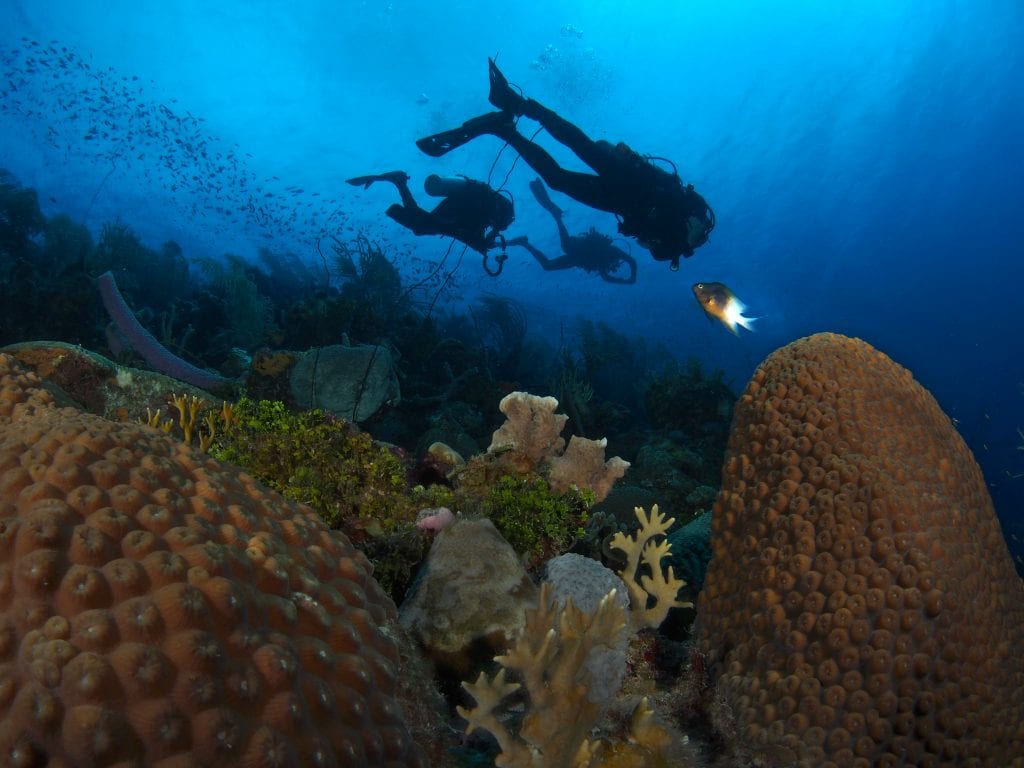
To get your SCUBA diving certification you’ll need to meet with a certified diving instructor. The courses which are offered under our Diving Fundamentals section will give you the basic diving skills and knowledge you need to begin your journey to becoming a qualified SCUBA diver. Along with supervised dives, you’ll be required to do your own independent studying of safety guidelines and specific diving techniques. You’ll also be required to learn the basic safety guidelines and skills that are needed to experience a variety of new things such as:
There are quite a few pieces of equipment you’ll need for SCUBA diving, but the most basic tools you’ll need are:
Keep in mind that the rental of almost all of this equipment is included in almost every class tuition that Dreaming Sea Divers offers!
Interested in expanding your dive abilities? Then connect with John at Dreaming Sea Divers today to get your SCUBA diver certification! He emphasizes the importance of safety in his courses and is always willing to help a new diver improve their skills. His goal is to make everyone confident, safe, and able to plan and execute dives with a qualified buddy. See how John can help you become a certified diver today!
 All divers begin getting their qualifications with a beginner’s Open Water course. It teaches novice divers some basic information and techniques, providing you with just the essentials to get you started. It’s great for learning how to use your scuba equipment and gives you the chance to practice your skills in a low-key setting. Once you learn the basics, it’ll only be a matter of time before you get the urge to do more challenging dives. The advanced scuba certification gives you the opportunity to go on more difficult dives by enhancing your skills and helps you feel more confident as a diver.
All divers begin getting their qualifications with a beginner’s Open Water course. It teaches novice divers some basic information and techniques, providing you with just the essentials to get you started. It’s great for learning how to use your scuba equipment and gives you the chance to practice your skills in a low-key setting. Once you learn the basics, it’ll only be a matter of time before you get the urge to do more challenging dives. The advanced scuba certification gives you the opportunity to go on more difficult dives by enhancing your skills and helps you feel more confident as a diver.
With the advanced scuba certificate, you’ll be able to dive deeper into underwater territory you’ve not yet experienced. And, if you plan to dive professionally, then this course is a must. It’s clear there are many advantages to getting your advanced diving certification and John is happy to help you get there. As a certified Master Scuba Diver Trainer, he can help you complete your certification, providing you with quality and valuable information and training along the way.
The advanced diver certification gives divers greater opportunities when it comes to underwater excursions. The certificate can be obtained through an Advanced Open Water course taught by a certified dive professional. During the course, your dive instructor will give you in-depth knowledge about diving practices, equipment, and safety which you’ll then use on your guided adventure dives.
The advanced diver's course is designed to give divers more experience so that they feel more confident and become self-sufficient in the water in different scenarios and conditions than their open water course. With the help of your instructor, you’ll develop new skills to expand your diving opportunities and experience more of the underwater world.
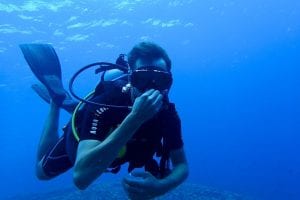 What are the advantages of having the Advanced Scuba Diver Certification?
What are the advantages of having the Advanced Scuba Diver Certification?There are several advantages to getting your advanced diver certification from gaining more experience to becoming a dive professional. Not only does the advanced diver certification give you comprehensive information about diving, but without the certification, the types of dives you’re able to participate in are more limited. So, along with being a great way to continue your education, the advanced diver certification can help you continue to experience more and go on greater underwater adventures. See how an advanced diver course can help you grow as a diver!
The advanced diver course takes students on 5 adventure dives which help divers get to feel more confident and natural when they dive. Through specialty training with your instructor, you’ll learn new dive skills such as buoyancy control and navigating underwater. During these adventure dives, you’ll practice new diving techniques and familiarize yourself with new dive specialties.
There are many levels and types of diving which can be mastered over time. The advanced diver certification is the first step in continuing your dive education. It’ll open doors to new diving opportunities that otherwise aren’t possible.
Another advantage of obtaining your advanced diving certification is it allows you to pursue diving professionally. Without this certification, you won’t be able to move up in the diving community which limits the dives you can participate in and keeps you from improving your skills. If you love diving as much as our instructor John, then you’ll definitely want to get certified so you can become an expert diver, too.
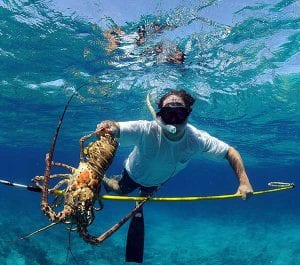 Get Certified with Dreaming Sea Divers
Get Certified with Dreaming Sea DiversInterested in expanding your dive abilities? Then connect with John at Dreaming Sea Divers today to get your advanced scuba diver certification! As a certified PADI, SDI, and SSI Instructor with thousands of recorded dives under his belt, John is beyond passionate about helping others develop and embrace their love for diving. He emphasizes the importance of safety in his courses and is always willing to help a diver improve their skills. See how John can help you become a better diver today!
With the modern invention of the SCUBA tank, exploration of the oceans has been changed dramatically, but still, people continue to free dive. Ancient people all around the world have been exploring the oceans for centuries without an air cylinder.
However, in the debate of SCUBA diving vs. freediving, the differences go deeper than just the equipment. While both are a similar adventure, the technique and overall experience between the two is vastly different, and each person has a particular perception of the dive. It is truly a matter of taste.
The most obvious difference between SCUBA diving vs. freediving is the use of an air tank and other relatively cumbersome equipment like masks, gloves, regulators, depth gauges, and in today’s age, a dive computer. In contrast, while you really don’t need anything to go free diving, the most basic equipment includes a mask and fins. It’s also common to wear a wetsuit and a snorkel depending on your objective. With freediving, the most important thing you dive with is your dive buddy.
When people started using tanks to explore oceans the technique had to evolve with the technology. SCUBA divers must pay careful attention to their ascents, descents and take routine safety stops to avoid decompression sickness. They have to be aware of the nitrogen levels in their bodies. This makes SCUBA diving a slower, more thought out adventure than freediving.
On the other hand, freedivers don’t have to worry about nitrogen levels or slow ascents and descents. Freedivers have much more maneuverability than SCUBA divers. However, freedivers are challenged to hold their breath throughout the entire dive. Freediving requires a great deal of practice and training to be able to stay down for an extended period of time.
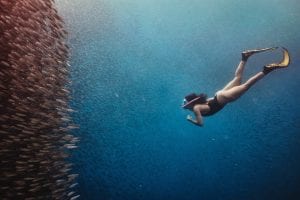
While the differences in gear affect the technique, the technique affects the experience. So if you’re SCUBA diving, you will have the advantage of staying underwater for longer. The longer you stay down, the more time you have to observe marine life and underwater geographical features. This means the longer you stay underwater, the more your eyes will adjust to the dark lighting which can increase the vibrancy creating a totally different image than a freediver. The length of time also influences how much you can explore. For example, if you’re going down to an underwater shipwreck or canyon you will be able to explore it more thoroughly.
However, freediving also has its benefits. Without the need for a tank, a freediver is able to swim smoother through the water and have a different experience with marine life. There is no added noise or disturbance because you are simply holding your breath. This can allow a freediver to get up close to schools of fish or turtles without scaring them off.
It has also been pointed out by avid ocean explorers that one of the biggest differences between SCUBA diving vs. freediving is the sense of awareness. When you are SCUBA diving you are enabled to mainly focus externally on your surroundings and gear. You are constantly analyzing these things and reacting to external forces underwater.
In freediving, it has been described as a more inward-focused experience where you are challenging yourself while still exploring. Your perception of yourself and your surroundings are altered when your mind is in a survival state, and you have to pay careful attention to what your body is telling you.
While the debate of SCUBA diving vs. freediving can go on forever, Dreaming Sea Divers has the best of both worlds. Here at Dreaming Sea Divers, we offer classes and guided experiences for both types of diving. If you have any questions or want to learn more about us, head over to our contact page or give us a call at (607) 624-6770.